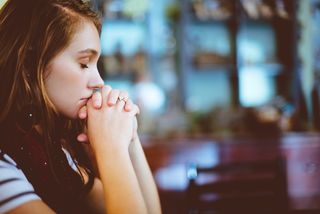Fear
Being Kind to Yourself in the Midst of a Pandemic
How to release yourself from chronic fear and stress about the coronavirus.
Posted March 17, 2020 Reviewed by Gary Drevitch
Last week, before the school closures and the stopping of “normal” life, I spoke to a room of high school seniors and was asked, “What does social psychology have to say about how we are responding to the coronavirus?”
I responded with a question. “What happens when something occurs that frightens you? For instance, if you saw a snake near you?” The well informed students responded, “fight, flight…” and I added “...or freeze. That is right, when we feel fear, our brains often get us out of harm’s way before we are even consciously aware of why. We flinch, run, react. Our brains are designed to help us recognize threats and survive."

Their eyes stayed on me, so I continued. “Now, what do you think happens when we experience chronic fear, when we are feeling a constant sense of unease?” The students started to answer with words like “tension,” “preoccupied,” and “stressed.” They were right. When we are experiencing chronic fear, we are on alert and attending to any information that will give us control and reduce the ambiguity of the situation. We want ourselves and the people we love to survive and stay out of harm's way. Our bodies hold this tension in many ways that can include increased stress hormones, tension in our muscles, stomach upset, and more.
Their youthful faces did not look hopeful. Just the mention of chronic fear was a reminder that the impacts of coronavirus were not just in some other country, but invading the safety and certainty of our previously stable lives. They sensed that a life where food and toilet paper are abundant, socializing at night in large groups was safe, and one could count on school being open the next day, was drifting away.

How do we take a break and interrupt the fear and stress cycles?
The room of eyes betrayed the concern that they had about what might come next. And so I added, “What can we do then?” Nobody answered, so I continued. “Are you safe right at this moment?” Heads shook up and down. “That is right; in this very moment we are all safe. And any fear you may have is really about the future.” I watched the eyes of the students as I repeated the words. I could see that they had lost sight of their immediate safety and they were remembering. I added, “Nobody at this moment is in mortal danger. Our nervous systems need to be reminded periodically that we are okay. If all you do is stop periodically today and remember you are okay, that gives your fear and self-protection systems a well-needed break.”
A student then asked, “Don’t we need to stay alert though?” My answer led to a second point: “We can be prepared and avoid situations that put us in greater danger without being fearful all the time. These don’t have to be connected. We actually get to choose how much attention we want to give to anticipating what is coming. If we put all your attention on that, we might miss the joys and blessings that exist today. Balance is important.”
As a social psychologist, I had to add a third idea which was that research shows that our levels of stress and fear are often reduced when we are not alone (or in the language of the research, “accompaniment is useful”). There are benefits to connecting with the people and things that help us remember to enjoy life (even when there are challenging times), as long as you aren’t compromising your health and theirs in the process.
When our automatic response to threats is to feel fear and stress, it is especially important to fight for our well-being and not let the fear overtake our minds, bodies and lives.
Having walked away from the talk, a few more ideas come to mind to help with living through these unprecedented times that may also be helpful.

Find ways to release the stress caught in your body. Exercising and making sure your body doesn’t lock down is important. Exercise can reduce anxiety, depression, and stress (Harvard Health Publication, 2011).
And last, in whatever small or big ways you can, be of service to others: In other words, practice kindness. I was reminded by my Sweetie that for some people, doing and helping are important ways to process fear and troubles. These acts can shift our focus, restore a sense of control, move our bodies, and transform our hearts (Zaki, 2019).
I know this is a crazy time and we are all being tested with regards to who we want to be when a thread is pulled in the fabric of our society and we suddenly realize everything is interconnected (Capra & Luisi, 2014). This is also a perfect opportunity to remember to do the kind thing and give ourselves permission to not be in a constant state of fear and anxiety.
References
Capra, F. & Luisi, P. L. (2014). The Systems View of Life: A Unifying Vision. Cambridge, UK: Cambridge University Press.
Harvard Health Publications, Harvard Medical School, Harvard Men’s Health Watch. (2011, February). Exercising to relax. Retrieved from http://www.health.harvard.edu/newsletters/Harvard_Mens_Health_Watch/201…
Zaki, Jamil (2019). The War for Kindness. New York: Crown.


